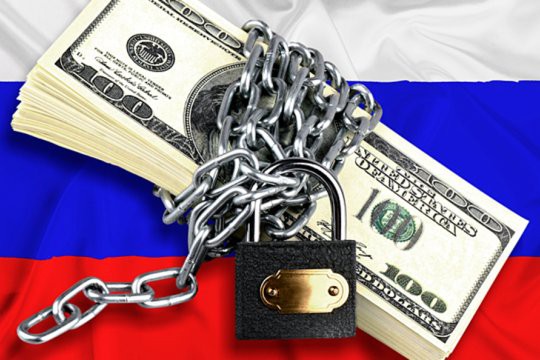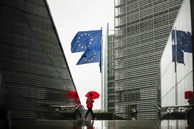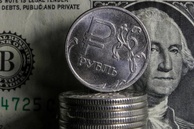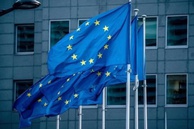Last week, Moscow once again reminded the European Union about the serious consequences of attempts to confiscate Russian assets currently frozen in Europe.
New statements concerning Europeans' intention to "use" the assets of the Russian Central Bank frozen in EU countries came shortly before the October 1 informal European Union summit in Copenhagen. Nearly 185 billion euros of the estimated 210 billion Russian assets frozen in Europe are held in Euroclear, the central securities depository in Brussels. To date, securities worth about 176 billion euros have matured and become cash.
In mid-September, European Commission President Ursula von der Leyen unveiled a new "scheme" for using frozen Russian sovereign assets to finance the Kyiv regime. This implies the use of both the assets themselves and the income they generate as collateral for a so-called 140 billion euro "reparation loan" for Ukraine. The EU member countries will thus collectively bear the risks associated with the obligations. Ukraine will start repaying this loan only after Moscow "agrees to pay reparations."
In Moscow, President Putin’s press secretary Dmitry Peskov once again warned European leaders that Russia would use legal action against any individual or country that "steals" its money, and cautioned that the theft of Russian assets would negatively impact European depositories and investments.
"We are talking about plans for the illegal seizure of Russian property – in plain Russian, about theft," Peskov told reporters. In the event of the theft or illegal appropriation of Russian assets or income generated by them, all involved parties "...will be brought to justice one way or another." i
Any countries involved will be held accountable too. The Kremlin has repeatedly stated that attempts to seize assets would undermine confidence in the European Central Bank system, in the euro as a currency, and in the perception of property security and property rights in Europe. Against this background, Hungary’s Prime Minister Viktor Orban made clear his reluctance to introduce the euro in his country due to what he described as the "collapse" of the European Union.
Peskov also noted that the new plans for "using" Russian assets represent "...additional steps towards the complete destruction of trust in the principle of inviolability of property. The boomerang will seriously hit those who are the main custodians of capital and rely on investment attractiveness," he warned. ii
Moscow has been trying hard to secure its foreign assets ever since they were frozen in spring 2022. By October of last year, the Belgian depository Euroclear reported a significant number of lawsuits, most of them filed in Russian courts. Even though the jurisdiction of Russian courts does not extend to unblocking assets located in Belgium, they can apply retaliatory measures against Euroclear's own accounts in Russian financial institutions. This involves funds belonging mostly to Western companies, which, in turn, may file financial claims against the Belgian depository. The growing deficit in Euroclear’s balance sheet is an additional factor of tension, causing a great deal of concern among its shareholders.
To make up for potential legal costs, the depository reserved 10 percent of the profits generated from frozen Russian assets, and additional funds may be withheld if the scale of litigation goes up. Western observers then warned that this practice could reduce the amount of funds available to service a 45 billion euro loan, which the G7 countries had promised Kyiv earlier that same autumn.
Faced with Moscow’s unflinching position, the European Union, after long wrangling, managed to agree on just an interim "scheme" for using Russian sovereign assets, which has been in effect since 2024. It comes down to placing free funds in an interest-free account, nominally owned by Russia. These funds are managed by Euroclear to generate interest income. Subsequent withdrawal of these funds is made through a special tax. By the end of 2024, the volume of such revenues amounted to almost seven billion euros.
European officials and lawyers assess the likelihood of Russia successfully challenging the existing scheme in court as low. Although Moscow could initiate a claim for lost profits, European experts believe that any evidence of the funds in its accounts being used "is absent." However, the new "scheme" proposes either the purchase of short-term zero-coupon bonds for cash or the use of the principal amount of assets as collateral. Critics are convinced that the Russian Federation will get legal grounds for claiming a violation of property rights, which would significantly increase its chances of success in courts.
Realizing the legally dubious nature and undesirability of the new "initiative," Belgium insists that sovereign states, rather than private banks, act as defendants in potential lawsuits, which increases the system's resilience to litigation and asset depreciation risks. The Russian Federation, in its turn, views any operations with its frozen assets as illegal appropriation and intends to defend its rights not by legal means alone. Moscow has also warned that it may resort to asymmetric retaliatory measures, including the seizure of foreign assets on its territory.
On October 1, Bloomberg reported, citing a "source close to the Russian Government," that Moscow could nationalize and sell foreign assets if Europe decides to seize Russian assets abroad. On September 30, President Vladimir Putin signed a decree authorizing the fast-track sale of federally owned property under a special procedure. The decree limits the preliminary valuation period for assets to 10 days and accelerates state registration of ownership. It also comes as a response to sanctions against Russia.
The decree aims to speed up the sale of various companies, both Russian and foreign, said a source familiar with the situation, who wished to remain anonymous. According to him, if the European Union starts seizing Russian assets, Moscow could respond with symmetrical measures. Bloomberg believes that this potentially involves the property of "hundreds of Western companies working in various sectors - from banking to consumer goods manufacturing" that continue to operate in Russia, including UniCredit SpA, Raiffeisen Bank International AG, PepsiCo Inc., and Mondelez International Inc. Moreover, in response to similar actions by Western countries, foreign investors' assets estimated at up to 40 trillion rubles are frozen in "Type C" accounts at the National Settlement Depository on the Moscow Exchange.
Up until now, wary of this threat, some elements of the Western business community have been against the confiscation of the frozen Russian assets. Thus, the situation with the Western assets in Russia mirrors that of the Russian assets in the West. Essentially, both have been temporarily removed from circulation, but in the event of a final confiscation of Russian assets, the full nationalization of foreign funds in special accounts in the Russian Federation becomes legally and politically justified.
Vladimir Putin's decree came ahead of the EU leaders’ meeting in Copenhagen, when they discussed a plan to provide the Kyiv regime with loans totaling 140 billion euros at the expense of frozen Russian Central Bank assets. It is assumed that EU leaders may make a final decision during the official summit scheduled for later this month. On October 2, Dmitry Peskov once again emphasized that "if seizure occurs, there will be a response." Last week, President Putin also warned that the global financial order would be undermined if the West took steps to seize Russia's frozen state reserves abroad.
On October 2, it became known that Belgium had blocked the approval of the scheme to provide a loan to Ukraine, secured by frozen Russian assets. During the Copenhagen summit, the Belgian side, which has jurisdiction over a significant portion of the Bank of Russia's reserves, suspended discussions on this issue, conditioning its agreement on distributing associated risks among all EU member states. According to sources, a number of European leaders generally supported the proposed scheme but demanded that the European Commission conduct a comprehensive analysis of its potential legal and financial consequences. iii
On October 3, Euroclear called on the European Commission to ensure adherence to the principle of inviolability of the Russian Federation's assets.
"We call for compliance with legal norms, including principles of international law, regarding the use of assets of the Central Bank of Russia," a Euroclear official told RIA Novosti. He also emphasized the need to adhere to the fundamental principle of immunity of state property. He concluded by warning that any unlawful actions regarding these assets could undermine confidence in the stability of the global financial system and the reputation of the depository itself.
While stating their readiness to “use” the lion’s share of the frozen Russian assets, the EU leadership and the leaders of a number of EU member states may imply that the proposed mechanism is not identical to their direct confiscation and may be perceived by Moscow as the least hostile measure. This is a big mistake, which demonstrates Brussels' misunderstanding of the decision-making logic and priority system of the Russian leadership. Although the specific nature of Moscow's retaliatory steps remains a matter of conjecture, the fact of their inevitability is beyond doubt.
------------------------------------------------------------------------
https://www.vedomosti.ru/politics/news/2025/10/01/1143388-peskov-nazval-vorovstvom
https://www.ft.com/content/214dc782-8900-4531-87ac-3f01e7221849
read more in our Telegram-channel https://t.me/The_International_Affairs

 15:22 07.10.2025 •
15:22 07.10.2025 •


























